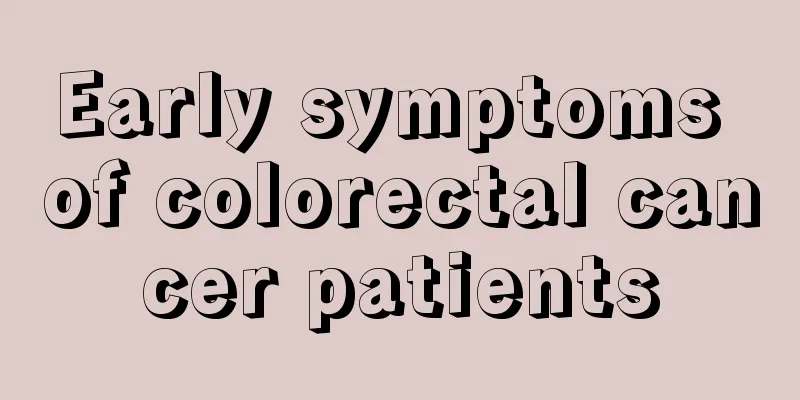Early symptoms of colorectal cancer patients

|
In the early stages of colorectal cancer, patients may experience some mild but important symptom changes, such as increased farting, unpleasant odor, increased gastrointestinal motility, etc. Understanding these symptoms can help detect them early and take action. 1. Increased farting and changes in odor Farting more often and becoming more pungent may be a sign of increased bacterial activity in the intestines. These changes are often associated with an imbalance in the intestinal flora, perhaps due to the effects of a tumor. Although farting is a normal physiological phenomenon, if you find that the changes are obvious and persistent, it is worth paying attention. 2. Increased gastrointestinal motility Changes in gastrointestinal motility may manifest as abdominal discomfort or increased borborygmus. This condition is usually caused by changes in pressure in the intestines or a tumor that affects the normal digestive process. If this phenomenon persists, it is recommended to consult 3. Changes in stool color and properties Darkening, black or red stools may indicate bleeding in the intestines. Changes in stool consistency, such as thinning or irregularity, may also be due to a tumor in the intestines that is blocking the normal bowel movement path. These symptoms require special attention and prompt medical attention. 4. Changes in bowel movement frequency A significant increase or decrease in the number of bowel movements may be a sign of affected intestinal function. Whether it is diarrhea or constipation, if it lasts for a long time, it may be related to colon cancer. Recording these changes in time and communicating with your doctor can help with early diagnosis. 5. Other related symptoms Early symptoms may also include mild abdominal pain or discomfort. Although these symptoms may be confused with other gastrointestinal problems, persistent abdominal discomfort warrants attention. A comprehensive judgment combined with other symptoms can more accurately identify the problem. To reduce the risk of bowel cancer, it is important to maintain a healthy lifestyle. Eating fiber-rich foods such as whole grains, fresh fruit and vegetables helps maintain a healthy gut. Regular medical checkups, especially colonoscopies, can help detect potential problems early. If you or someone around you has the above symptoms, don't take it lightly. Early detection and treatment are the key to improving the cure rate of colorectal cancer. Maintaining good communication with your doctor and undergoing professional examinations in a timely manner are important steps to protect your health. Remember, every signal from your body deserves to be taken seriously. |
<<: Will I have a fever after liver cancer surgery
>>: What are the pathological types of kidney cancer?
Recommend
Can onions cure insomnia? How to do it
Scallions are very common in our daily life. They...
What are the symptoms of gastritis with erosion? Be careful about acid reflux and retching!
Some gastritis patients often hear this term - ch...
There is a hard lump under my mouth
In life, many people often get a big lump here or...
Does hair take up nutrition when it grows?
The older generation often says that long hair wi...
How should you do the ani-lift exercise?
Many people may have hemorrhoids now. Most people...
Things to note after hyaluronic acid filling
Among our skin care products, many brands will cl...
The advantages and disadvantages of taking a sauna
Sauna originated in Finland and has only become p...
Experts introduce mid-term treatment methods for liver cancer
Many patients with liver cancer are already in th...
Use a few dollars to cure gray hair
Use 10 to 20 grams each of mulberry leaves, cypre...
There is a white spot on the back
People always have some minor skin problems, some...
Can fat turn into muscle?
Fat and chicken are two different tissues, and fa...
How long does it take to get cervical cancer after being infected with HPV
How long does it take to get cervical cancer afte...
Gastrointestinal growing pains
As many people know, the gastrointestinal tract i...
Symptoms of excessive toxins in the body
Body toxins are harmful substances that accumulat...
When will the hot weather end
There are four seasons in a year, and each season...









